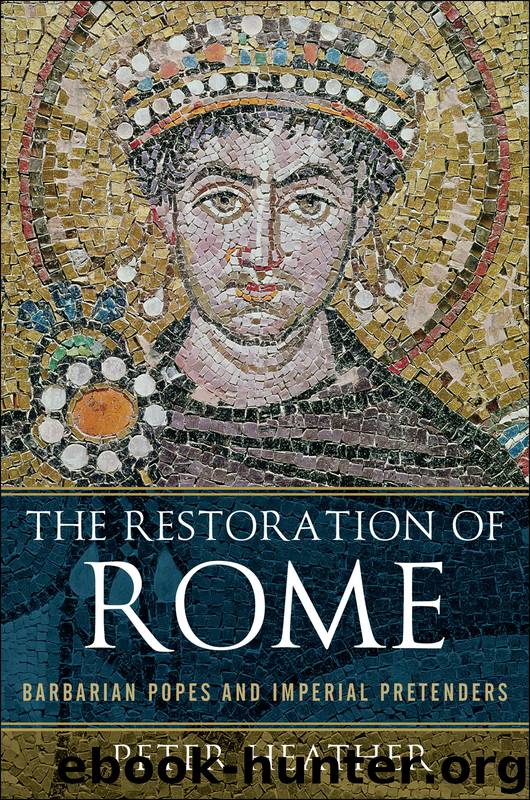The Restoration of Rome by Heather Peter

Author:Heather, Peter
Language: eng
Format: epub
Publisher: Oxford University Press, USA
Published: 2013-03-24T16:00:00+00:00
THE PERILS OF POPE LEO
The answer to the second question is straightforward. The only legitimate emperor, according to all the official definitions of imperial propaganda, was one who was divinely appointed. The trick, of course, was how to be sure that any particular individual was divinely appointed, because theory allowed for the contingency that illegitimate, man-made emperors might insert themselves into the role from time to time.
Generally speaking, two telltale signs were used. First, an emperor who was truly there by divine appointment would be successful, since God was indeed an omnipotent deity. And military victory was usually held up as the sign par excellence of true, God-supported legitimacy. Second, an individual truly chosen by divine will could not help but become emperor, whatever they or anyone else did, because God willed it. By straightforward inversion, overweening ambition was a clear sign that the individual in question was entirely unworthy of the job. Thus the emperor Julian famously muttered ‘Purple death has seized me’ when appointed Caesar by his cousin the Augustus Constantius II, a Homeric tag that could be used to signal resistance to unwanted promotion. For the same reason, Julian was extremely careful to establish some more or less plausible deniability when his troops later hailed him as Augustus – in a direct challenge to Constantius’ authority – when all the indications are that he not only knew that his troops were going to proclaim him, but had in fact had his people organize it. The same trope was also popular in the Christian context where it soon became fashionable for any seriously holy individual to be recorded in his Life as having done his damnedest to avoid episcopal office, before finally giving in because there was ultimately no choice.28 And that was, of course, the perfect mark of true divine appointment: if God willed it, there would, in the end, just be no avoiding it.
Einhard was well read in the classics, modelling his biography of Charlemagne quite substantially on Suetonius and displaying knowledge of a wide variety of other ancient texts besides. He certainly knew plenty, as did many of his fellow intellectuals at court, about how one might set about identifying true divine appointment. In other words, Charlemagne and his advisers knew perfectly well that if they were caught with their hands too obviously in the imperial till, then the presentation of their man as divinely appointed would start to ring hollow. This, then, was Charlemagne’s dilemma in the face of a Western imperial tradition that had been broken in the fifth century. As soon as he had definitively smashed the Lombard kingdom, he had fulfilled the criterion of military victory in spades, and the rest of his reign just went on to confirm the fact of God’s support, as one territory after another fell into his lap at the point of a sword. But if, by this means, God was making it clear that Charlemagne was chosen to be His emperor, how could that fact
Download
This site does not store any files on its server. We only index and link to content provided by other sites. Please contact the content providers to delete copyright contents if any and email us, we'll remove relevant links or contents immediately.
Resisting Happiness by Matthew Kelly(3337)
The Social Psychology of Inequality by Unknown(3017)
Day by Elie Wiesel(2779)
Designing Your Life by Bill Burnett(2738)
The Giving Tree by Shel Silverstein(2336)
Human Design by Chetan Parkyn(2068)
The Supreme Gift by Paulo Coelho(1962)
Angels of God: The Bible, the Church and the Heavenly Hosts by Mike Aquilina(1954)
Jesus of Nazareth by Joseph Ratzinger(1809)
Hostage to the Devil by Malachi Martin(1800)
Augustine: Conversions to Confessions by Robin Lane Fox(1769)
7 Secrets of Divine Mercy by Vinny Flynn(1733)
Dark Mysteries of the Vatican by H. Paul Jeffers(1704)
The Vatican Pimpernel by Brian Fleming(1698)
St. Thomas Aquinas by G. K. Chesterton(1632)
Saints & Angels by Doreen Virtue(1603)
The Ratline by Philippe Sands(1569)
My Daily Catholic Bible, NABRE by Thigpen Edited by Dr. Paul(1496)
Called to Life by Jacques Philippe(1475)
